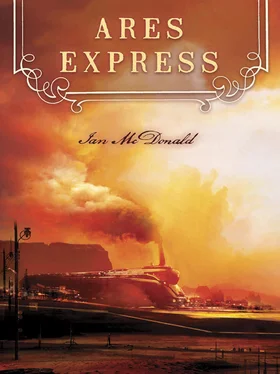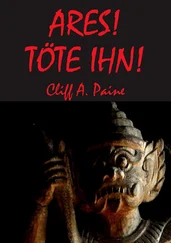“Battle stations!” Harx repeated as the squares and drills broke up into frantic motion. “To arms, our church is under attack!”
He nodded for Sianne to take command as a cloud of robot insects, black as smoke, poured from the spire-top airco funnels. He did not like to be seen by the faithful to be abandoning Armageddon, but there were tactics that only he could employ, and those in private. The true battle would not be fought under the glass plains, with gun turrets and Gatling bunkers, but among the shifting dimensions of his mirror maze. Devastation Harx swirled from the balcony. Sianne Dandeever cracked her knuckles and stood tall. Thank you God. At last. At long long last.
“This is it, boys!” she guldered at the top of her ample lungs to the running acolytes. “This is war!”

It wears off , they’d warned Lutra Blaine when she ticked the box in the job centre next to “Space Service.” And quicker than you think, too. Cartwheeling off the action end of the Skywheel space elevator ( no, it’s not me going arse-over-heels, it’s the stars carouselling around me ; the innocent solipsism of the work-placement cosmonaut) she had yippeed in her soul of souls as the red-green-occasional-blue mottle of her world rolled up in a great disc before her like a test for colour-blindness in the eye of the Divine. So tell me Ms. Blaine, what can you read down there? Nothing but a door out of three rooms and twelve bodies Level Twenty-Seven Deep St. Berisha Project NewMarket Down, Belladonna, Greatest of the Cities of the Valley. The doctors had warned her of possible agoraphobia. It would still not have grounded her. No one got turned down for space service. Not a problem, she said. Outer space was no bigger or blacker than inner space. The tunnels of the littler moon were no less pumicey and constricting. Space, like bedrock, was just another darkness into which you cannot go.
You do know you’ve more chance of winning the Fat Lotto every week for a year than seeing some, you know, action , the sheddle steward had said as he turned her the right way up and sent her and her canvas grip-bag sailing through the lock into the foam-padded reception bay.
That’s okay , she had thought as she swam through the thick, fart-whiffy air, wondering who the stocky, shock-headed smiler was down at the end of the cylinder, hand held out to welcome her to Planetary Defence System Terror. Just as long as the cheques keep coming.
The view was the one thing that had not tired. The constant vague nanogee nausea; the bloated, rodent face in the morning mirror; the unflagging, eroding energy with which Taroudant—the tousled grinner—tried to get his hand into the waistband of her draw-string Space Service baggies—most of all, this last—those she’d tired of by the end of her first shift. But her world, her home, the soil of her birth, her shelter and prison; spinning slowly like the hands of a great clock behind the watch-glass of the observation blister, she would wake from near-trance to find hours had vanished, witched out of her by the huge, slow-turning world beneath her. Twelve and a half years she had lived and crawled beneath the surface without ever once looking at its face.
Truth be told, Taroudant notwithstanding—he occupied an ecological niche all his own—the creaky old battle station was full of creeps. Unaccountable breezes eddied in the gritty pumice tunnels. Light panels would flicker as she swam past, or switch themselves off, or, more spookily still, on, illuminating vast, irregular, lung-like hollows she was quite sure did not appear on any of the moon maps. Machines loved to click and groan theatrically; spirals of dust would spin and sparkle in the hub-chambers where tunnel systems met, and what was that lingering smell of perfume, like ashes of roses? Taroudant would have been the obvious suspect, by the unfeasible logic that if he scared her enough she’d suck him off, except that she knew he sensed them too and, more primarily, he lacked the imagination for even that rudimentary ploy. And he never smelled of anything approaching ashes, let alone of roses.
No, ghosts there were in the old, hollow moon. That was the very idea of the place. An army of ghosts, to be resurrected from the crusty regolith in the hour of its primary’s need and thrown into final battle. She’d glimpsed the ranked processors behind their diamond viewing panes, waiting in supercool quantum chill to spin soldiers out of stone, like ice goblins in faerytales. The cold got into her bones, never really got out again, in the long, empty spaces of Planetary Defence System Terror. She floated warily past the empty templates mounted on the walls, breast-plated and beaked like insect warrior armour. Too many eyes, too many toes, too many arms that ended in too many blades, like ever-opening penknives. Slashers stabbers impalers gutters beheaders. All our warfares in the end come down to hand-to-hand. Stick a piece of sharp metal through your enemy. Simple and reliable. Like Taroudant. He came down to the hand-to-hand, in the end. Impale with a pointed weapon. Knob knob knob knob knob. Simple and reliable.
Two people; man, woman, trying to avoid each other in a worm-eaten potato of a moonlet, two billion humans’ final defence against interplanetary attack. Oh. Forgetting of course, SERAPAMOUN, Cheraph, exalted one, genius loci, seeded so thoroughly and minutely through Terror that the whole planetoid could be said to be one great orbiting brain. The real trigger finger, silent as only the angels can be silent, patiently waiting for a word certain never to be spoken, that would transform moon-stuff into machine warriors and send them falling out of the evening sky like diamond rain in their spin-carbon reentry shells.
Sometimes, as she hovered above the great viewing eye, Lutra Blaine wished for even a rumour of war. A blip on the sensors that watched the edges of System. A sudden rip in reality, spewing dagger-edged starfighters from some alien empire, filling all circumambient space with lambent beams of coruscating force. Skyjack and piracy on one of the big, stately Sailships. Something to set the alarms ringing and the amber lights pulse-rotating and Lutra and Taroudant hand-over-handing at flank speed along the tunnelways.
Nah.
So there was always the world, and it was unfailingly wonderful. The amazement that geography was actually the same as drawn in the atlas. The miracle of clouds seen from above. The revelation that weather moved and you could watch the birth, life and death of a storm. That the seas had currents, that the mountains had snowcaps and that the green of spring visibly spread south day by day. A thought unfolded the opticon arm, through its eye Lutra could look past the clouds to see the wakes of ships on her world’s small, landlocked seas. She could squint through the dazzle of sunlight from Worldroof to map the towns and tight-packed city-states of Grand Valley’s floor. She could track the progress of the great trains across the quarterspheres by the white plumes of steam lashing out behind them. She loved the trains most, cranking up the magnification on the opticon until she could make out the spider-silk threads of the tracks themselves, their junctions and switchovers, trying to guess the route this freight would take, that passenger express. The train was freedom. The iron way out. Her hormone-haunted teenage sleep had been broken at least once a night by a whistle far away through the labyrinth of stone streets and downramps between St. Berisha and Belladonna Main. Train a’leavin’. Without you, Lutra Blaine.
“Child’a’grace, not again!” she grimaced.
Читать дальше













